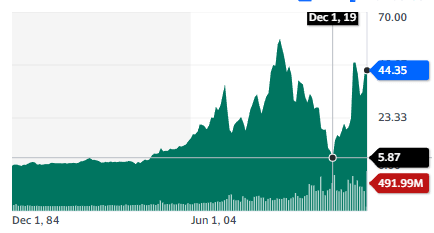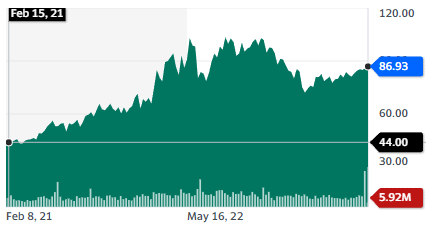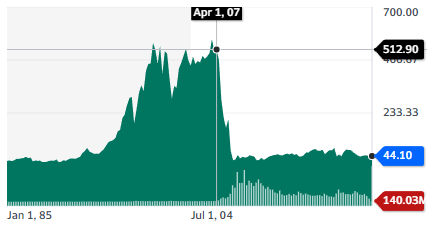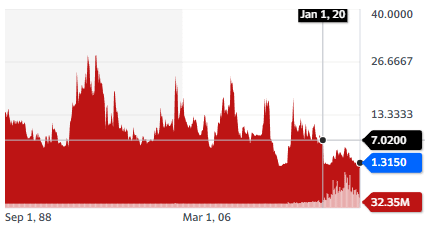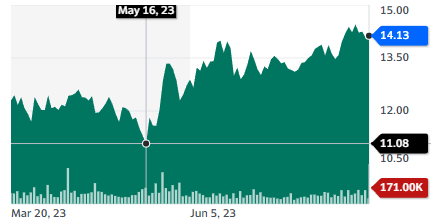Green energy (and maybe nuclear) may someday be enough to decarbonize our energy systems. Until that day arrives, natural gas – the most climate-friendly hydrocarbon fuel – will be a major part of the energy mix, and that popularity has investors looking for the best natural gas stocks.
Natural gas is often described as a perfect “transition fuel”: still a fossil fuel, but acceptable until greener alternatives are ready to replace it. You can read more about it in this in-depth report by the EIA.
The Best Natural Gas Stocks
Natural gas is mostly transported by pipeline or in the form of LNG (Liquefied Natural Gas). This article will cover both.
Natural gas is also often produced in conjunction with some oil, so many gas stocks are also, to some extent, oil stocks, even if the majority of their production is gas.
We’ll try to offer a diverse view of the sector and focus on a few of the best natural gas stocks, but we won’t even come close to covering all the possibly attractive stocks.
This list of the best natural gas stocks is designed as an introduction; if something catches your eye, you’ll want to do additional research!

1. EQT Corporation (EQT)
First on our list of the best natural gas stocks is EQT, the largest producer in the US, with shale deposits in the Appalachian Basin. EQT produces so much gas (5.3 bcfe/d – billion cubic feet equivalent per day) that it would be the 12th largest gas producer in the world if it were a country. Reserves are at 25 TCFE (trillion cubic feet equivalent).
The company’s production has sometimes had difficulties in reaching markets, leaving Appalachian gas at a discount to the national market. The situation could improve with the ongoing construction of the Mountain Valley pipeline, expected to start in Winter 2024 and be fully finished by 2027. The company has also closed a $5.2B deal to buy more pipeline capacity.
Another option for EQT is selling abroad, with LNG prices much higher than domestic natural gas prices. The company is starting to reach this market with a recently signed HOA (Heads of Agreement) with Lake Charles LNG representing 135 MMcf/d. Overall, only 33-37% of EQT gas is left exposed to “Appalachian pricing”.
The company aggressively repurchased its shares when they were trading at a lower price. It also has very high capex efficiency, among the highest in the industry.
EQT’s emissions are also among the lowest in the world, with a target for net zero by 2025. This makes the company uniquely ready for the possible risk of carbon taxes.
Thanks to its scale, EQT is one of the most efficient gas producers in the US, and it is still trading at low multiples, considering gas prices are still relatively low, leaving some potentially large upside for its shareholders. It’s one of the best natural gas stocks for investors who want to focus on US domestic production.
2. Chesapeake Energy Corporation (CHK)
When the shale revolution happened in the 2010s, the first goal of all shale oil & gas producers was growth. The idea was that by improving the technology and reaching a sufficiently large scale, costs would decline and turn the shale companies profitable.
The results were less positive, with the expanded production of the shale industry flooding the world’s energy market, causing durably low prices, and even pushing Saudi Arabia into engaging in a destructive price war. Combined with the pandemic crash in demand, this led to a massive wave of bankruptcy in shale, including the poster child of growth at all costs, Chesapeake Energy. The company emerged from Chapter 11 in 2021.
Today, the company produces 3.7 bcfe/d of natural gas, with 15 years of inventory.
It has a changed focus on dividends and returning profits to shareholders, with $125M of share buyback and $515M of dividends in Q2 2023.
Thanks to its restructuring, the company only has debt maturing in 2026 and 2029, respectively, at 5.5% and 6.5%. This puts Chesapeake in a great position to benefit from rising interest rates, which raise the cost of capital for its competitors while it keeps operations going and distributes a generous dividend.
That makes Chesapeake one of the best natural gas stocks for generating dividend income, very different from its pre-bankruptcy growth profile.
3. Cheniere Energy, Inc. (LNG)
There are two ways to transport gas over large distances: by pipeline or liquefied in the form of LNG. While LNG “wastes” some of the energy in the gas, it also allows gas to be exported anywhere on Earth with special carrier ships, allowing arbitrage between pricing in different regions.
The USA has a lot of gas, while Asian markets are in demand for it. Europe is also now a major LNG market (probably permanently) following the war in Ukraine, the destruction of the Nord Stream pipeline, and the resistance toward dependence on Russia.
When evaluating the best natural gas stocks, Cheniere stands out with a total production capacity of 30 mtpa of LNG from its Sabine Pass and Corpus Christi facilities (in dark red and red below). Furthermore, they have plans to add another 20 mtpa, which is currently awaiting regulatory approval.
In 2022, 70% of Cheniere shipments were to Europe. This newly grown market has grown LNG demand beyond all previous expectations. The reopening of China has also boosted global demand. In the long run, the coal-to-gas switch for power production should keep the demand for LNG high, especially in Asia.
With the US abundance of gas from the shale revolution, LNG from the US is likely to stay a key part of the energy mix of both Asia and Europe, especially since the war in Ukraine. Cheniere is well positioned to benefit from this long-lasting change in the energy markets, taking in cheap US gas and exporting it abroad to higher-priced markets.
4. Tellurian Inc. (TELL)
Most natural gas companies specialize in a single segment, like production, liquefaction (LNG), or transportation. Tellurian aims to change that, with ambitious plans to become a leading integrated gas company.
The company is planning to build a large LNG terminal (Driftwood) with an export capacity of 27.6 mtpa. The first production is expected by 2026-2027. It is also looking to grow production in Northern Louisiana, in the Haynesville Shale Basin, and build a pipeline to carry this gas to the Gulf of Mexico and Driftwood LNG.
Tellurian will still need to find a partner to raise enough money ($1.8B to $4.3B) to achieve all of these lofty goals and is hoping to sell “only” 55% of its equity for it.
If all goes to plan, Tellurian could see a cash flow of $4.4B by the end of Phase I of the project, with further expansion to full-size finance by the Phase I cash flow, reaching a final cash flow of around $11B.
There are good reasons for Tellurian’s optimism:
- Global demand for LNG is high and likely to stay this way for the foreseeable future.
- US gas production is exceeding local demand, and production could grow further if export facilities were able to absorb this surplus.
Still, investors looking for the best natural gas stocks should be cautious when entering a highly cyclical industry on the basis of cash flow projections 5-10 years in the future. 2020 was definitely a low for the oil & gas industry, so it might work. There are still risks that must be taken into account, with diversification an important strategy.
5. Cool Company Ltd. (CLCO)
In Natural gas, a lot of attention is given to upstream (production) or multi-billion LNG liquefaction facilities. A smaller niche is the actual transportation by sea of the LNG. This requires very specialized ships, custom-built for this exact purpose.
When looking at the best natural gas stocks, one can’t ignore CoolCo, a newly IPOed company formed by bringing together LNG carrier ships from 2 industry leaders, Golar LNG and Eastern Pacific Shipping (Eastern Pacific Shipping owns 58% of CoolCo). It operates a fleet of 13 LNG carriers.
The company has benefitted from the rising shipping rates for LNG ships in response to the increased traffic and global demand following the war in Ukraine.
Most of these profits should be returned to shareholders, with CoolCo’s proposed policy dividends of $0.41 per share in Q1 2023 implying a yield of approximately 14%.
Because of the slump in price in the late 2010s, not many LNG ships have been ordered, and many shipyards went bankrupt, further reducing supply. The newly built ships are going to be partially compensated by retiring older steam turbine vessels due to increasingly stringent environmental regulations.
This should give a lot of pricing for LNG carrier companies and make CoolCo’s fleet a valuable long-term asset. Still, investors will need to be cautious, as the shipping industry and shipping rates are famous for being extremely volatile.
Best Natural Gas ETFs
Because natural gas is a CAPEX-intensive business in a highly cyclical industry, it is best to have a wide array of company profiles in a portfolio.
Besides investing in the best natural gas stocks, ETFs can help you have a diversified portfolio while reducing trading costs.
1. United States Natural Gas Fund LP (UNG)
This ETF tracks the fluctuation of the price of natural gas instead of investing in companies in the sector. This makes it more of a trading instrument than a long-term holding but might be interesting for betting on natural gas price fluctuations.
2. Global X MLP & Energy Infrastructure ETF (MLPX)
This ETF includes a range of energy infrastructure, including midstream (pipelines) and LNG facilities. Its top holdings are William Cos, Cheniere, and Enbridge. These companies tend to benefit from the volume of natural gas and oil consumption and be less exposed to commodity price fluctuations.
They are also often distributing a rather generous dividend yield, with many of them being dividend-rich MLP (Master Limited Partnerships).

3. SPDR S&P Oil & Gas Exploration & Production ETF (XOP)
This ETF has a strong focus on US exploration companies, as well as land trusts in oil-rich regions. Its top holdings include SM Energy, Texas Pacific Land Corp, Apa Corp, and CNX Resources (among the largest gas producers in the US).
This focus on proven resources and exploration makes it an interesting way to get reserves at a discount compared to international oil majors and to hope for continuous improvement in shale technology.
4. iShares Oil & Gas Exploration & Production UCITS ETF (SPOG)
This ETF includes most of the US shale and Canadian oil & gas producers, with a focus on exploration and growing production. Its top holdings are EOG Resources, ConocoPhillips, and Canadian Natural Resources. This makes it a good bet on the health of the North American energy industry in general.
5. iShares MSCI Global Energy Producers ETF (FILL)
This ETF includes all the largest publicly traded energy companies, including Exxon, Chevron, Shell, TotalEnergies, etc… This gives it a lot of exposure to gas but also to oil, refining, etc. It can be a complement to more natural gas-focused stock picks, bringing exposure to the fossil fuel sector at large.
Conclusion on the best natural gas stocks and ETFs
Natural gas might be as important to our future energy system as oil has since the 1950s. It is currently the best candidate to phase out coal while still producing easy-to-dispatch baseload power.
The shale revolution and the war in Ukraine have brought long-term changes to the natural gas markets, with extra value for US gas and LNG shipments. Investors can benefit from these changes by gaining exposure to the best natural gas stocks across the industry, including production, pipelines, LNG liquefaction facilities, and LNG shipping companies.
This a highly volatile industry, so cautious positioning and diversification are generally preferable. An eye on geopolitics and market cycles will be equally important.


